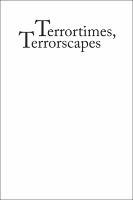Terrortimes, Terrorscapes
Continuities of Space, Time, and Memory in Twentieth-Century War and Genocide
Contributor(s)
Benkert, Volke (editor)
Mayer, Michael (editor)
Collection
Knowledge Unlatched (KU)Language
EnglishAbstract
Terrortimes, Terrorscapes: Continuities of Space, Time, and Memory in Twentieth-Century War and Genocide investigates interconnections between space and violence throughout the twentieth century, and how such connections informed collective memory. The interdisciplinary volume shows how entangled notions of time and space amplified by memory narratives led to continuities of violence across different conflicts creating ?terrortimes? and ?terrorscapes? in their wake. The volume examines such continuities of violence with the help of an analytical framework built around different themes. Its first part, spatial and temporal continuities of violence, looks at contested spaces and ideas of national, ethnic, or religious homogeneity that are often at the heart of prolonged conflicts. The second part, on states and actors, addresses the role of states as enablers of violence, asymmetric power dynamics, and the connection between imperialism and genocide in Africa. Imagination and emotion?the focus of the third part?explores utopian visions and their limits that instigate or hinder, and the mobilization of emotion through propaganda. Finally, the fourth part shows how the recollection of the past sometimes triggers new terrortimes. Departing from an understanding of violence limited to certain areas and time frames, this volume describes continuities of violence as overlapping fabrics woven together from notions of space, time, and memory.
Keywords
Political Science; Genocide & War CrimesISBN
9781612497303, 9781612497310, 9781612497327, 9781612497334Publisher
Purdue University PressPublisher website
http://www.thepress.purdue.edu/Publication date and place
2022Grantor
Classification
War crimes


 Download
Download